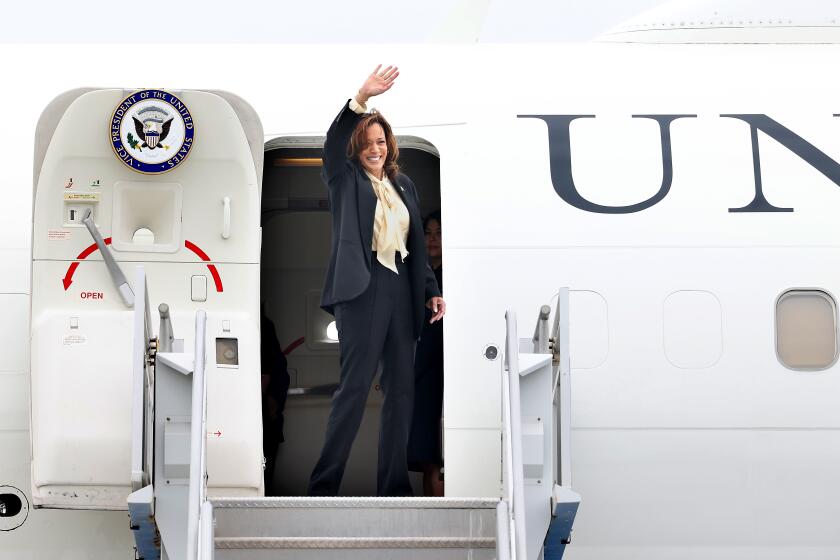Obama and gay rights
Gay-rights supporters weren’t satisfied by a vaguely reassuring speech:a=latimes_1min&feed;:c=nationnews&feed;:i=47783801 from President Obama in June about his eventual intention to eliminate the military’s “don’t ask, don’t tell” policy and to overturn the Defense of Marriage Act, which keeps the federal government from recognizing same-sex marriage. He’ll have to do better today when he addresses the Human Rights Campaign.
Nor will Obama allay the group’s frustration by announcing his nomination of an openly gay man as ambassador to New Zealand and Samoa, just as he did not placate gay men and lesbians by extending the benefits of federal employees to their domestic partners.
Obama is justified in moving somewhat slowly on his campaign pledges to the gay community. As anxious as we are to see gay rights recognized throughout this country, it also is important for the administration to set priorities and make progress in a politically strategic way. It was inevitable, given the unrealistic postelection expectations of immediate and all-encompassing change, that Obama would disappoint some of his constituencies in the first year or two. Right now, the president is rightly focused on healthcare and the economy.
What he can do today, however, is provide more forceful support for gay rights. He can outline a specific agenda and a plausible timeline for accomplishing it, rather than the sometime-before-I-leave-the-presidency assurances offered by administration officials in June. And he can take a stand on the same-sex marriage efforts that are forging ahead in the nation with or without a change in the federal marriage act.
Six states have legalized same-sex marriage, and two more recognize such marriages performed in other states. Washington, D.C., also recognizes those marriages, and it’s now expected to approve weddings within its boundaries. California recognizes an estimated 18,000 same-sex marriages performed here, but not those conducted outside the five-month window during which weddings were legalized. These fitful steps toward equality -- and the painful steps back, such as California’s Proposition 8 -- have brought the nation to a new level of contentious confusion.
Consider: Two men who wed in 2006 in Massachusetts, where same-sex marriage is legal, moved a year later to Texas, where it is banned. When the marriage didn’t work out, they sought a divorce. The couple couldn’t divorce in Massachusetts because they were no longer residents there, but Texas Atty. Gen. Greg Abbott argued that they couldn’t divorce in his state either because, as far as Texas was concerned, they weren’t married in the first place.
The logic is irrefutable, but the situation put Texas in the position of forcing two men to stay in their marriage -- at least, a marriage in the eyes of eight states and the District of Columbia. It also could force the couple to take the extraordinary action of moving more than 1,000 miles away to have their divorce -- and the division of property -- recognized by those states. Seeing this as a discriminatory hardship, a Texas judge has ruled that the state should recognize the marriage for the limited purpose of divorce. That ruling is expected to be overturned.
Conundrums like this will become more commonplace unless Congress repeals the 13-year-old Defense of Marriage Act, which gives states the option of refusing to recognize same-sex marriages that were legally performed in other states, even though they must honor the marital status of heterosexual couples.
In Maine, where legislation legalizing same-sex marriage was approved in May, opponents quickly gathered signatures for an election to keep the law from going forward. Under a procedure similar to California’s initiative process, Maine voters can override new legislation via a “voter veto.” The election is Nov. 3.
As with Proposition 8, the campaign for Question 1 in Maine employs accusations that same-sex marriage would result in churches being sued for refusing to perform such weddings and schools being required to teach about homosexual marriage. One television commercial is virtually identical to a spot that ran in the California campaign, featuring a Massachusetts couple who objected to the book “King and King” being read to their child in school.
Some of the claims are ridiculous scare tactics. Churches have strong constitutional guarantees of their right to practice as they please. Maine schools don’t have to teach anything about marriage or homosexuality. And if they want to introduce such lessons, they can do that without the state legalizing same-sex marriage.
As misplaced as these particular accusations might be, the fears behind them are based on reality. American culture is progressing rapidly toward acceptance of homosexuality, or at least a willingness to acknowledge that sexual orientation is not grounds for depriving people of their rights. More schools are adopting programs to halt bullying of gay and lesbian students because they recognize that children need these protections, not because of marriage legislation. Teachers make reference to families headed by same-sex couples not because of state curriculum but because of the realities of their students’ lives. A few religions bless same-sex unions, a reflection of changing thought on the relationship between sexuality and the divine.
One accomplishment that Obama will almost certainly mention in his talk today will be the House vote this week to expand the definition of hate crimes to include acts against victims based on their sexual orientation. It is a significant recognition that gay men and lesbians constitute a group that has been a target of discrimination and that deserves federal protection. Obama supports the legislation. Today, he must do more: offer a steady voice of support for equality and a strategy for bringing it about.
More to Read
Get the L.A. Times Politics newsletter
Deeply reported insights into legislation, politics and policy from Sacramento, Washington and beyond. In your inbox three times per week.
You may occasionally receive promotional content from the Los Angeles Times.










